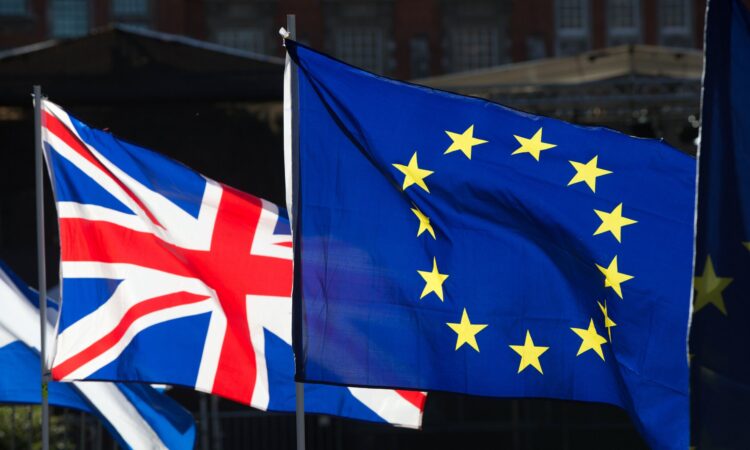
For the best part of three years, Brexit has been the issue that a large part of British politics has been trying to pretend doesn’t exist.
As far as the Conservatives were concerned, Brexit was already “done”, while Labour would do anything to avoid talking about something so prone to opening up divisions between the traditional and the more metropolitan wings of its support.
But towards the end of the year there were signs of it returning as a live issue. Following a grim Autumn Statement, briefings began to emerge from the Government – blamed on Chancellor Jeremy Hunt – that the UK could seek a “Swiss-style” arrangement to open up trade with the EU and boost the economy.
They came after the Office for Budget Responsibility (OBR) said Brexit had had a “significant impact on UK trade” which was 15 per cent lower in the long-run than if the country had remained an EU member.
The idea that much lower net immigration would be a Brexit benefit also came under challenge as the OBR said the UK’s recession would be deeper – and tax rises and spending cuts harsher – if fewer foreign workers came to Britain.
A poll commissioned by i found that more voters (47 per cent) would now opt for a closer economic relationship with Europe, even if it means following more Brussels rules, rather than sticking with the deal negotiated by Boris Johnson that gives the UK more regulatory freedom – favoured by 36 per cent.
The urge to play down the issue hasn’t disappeared. The Government has dismissed the idea it could seek to renegotiate Brexit, with sources insisting that talk of removing trade barriers was more about relatively small-scale tweaks such as the mutual recognition of qualifications.
And within Brussels, there is a similar determination not to reopen any of the major Brexit issues. “Only in the UK are people still arguing about Brexit,” a source said. “No one in Europe thinks about it any more.”
More from Politics
But the reality is Brexit is still taking up considerable bandwidth. A major focus in Downing Street right now is in fixing the Brexit issue that dogged much of 2021 (and 2020) – trading arrangements for Northern Ireland – with a resolution to the dispute a key precondition for any tweaks to the relationship with the EU.
The UK and EU are now under growing pressure from US President Joe Biden to get an agreement in the coming months, not least because President Biden is keen to visit Northern Ireland in April to mark the 25th anniversary of the Good Friday Agreement.
EU officials are cautiously optimistic about a breakthrough, which could resolve the issues over the Protocol and end ongoing arguments about a Brexit deal.
Sources say they have been encouraged by Rishi Sunak’s less confrontational tone and the decision to deprioritise the controversial legislation Liz Truss introduced as Foreign Secretary, which would allow ministers to unilaterally tear up parts of Brexit’s Northern Ireland Protocol.
One senior figure told i: “We are going to get to the right place eventually – the question is how much suffering there is first.”
Others are more sceptical, believing the Prime Minister may be “trapped” by Conservative hardline Brexiteers and unable to make the necessary compromises, which are likely to involve a climbdown on sovereignty.
As Anand Menon, director of the UK In A Changing Europe think-tank, puts it: “He’s going to have to face down the ERG (European Research Group), but I’m not sure he’s politically strong enough to do that.
“But if he doesn’t… then he’s got a massive problem.”
David Henig, UK director of the European Centre For International Political Economy (ECIPE), says the prize of striking a deal would be better trade with the EU, but that it will require Rishi Sunak to move.
“If he can shift, and it is him that has to shift, [and] the UK Government backtracks on the Northern Ireland Protocol, then that opens up more cooperation,” he said.
“If they can’t, then essentially this Government is stuck and can do no more on Europe. It clearly can’t go backwards to no deal, it can’t go forwards either, it’s just stuck, awaiting another government.”
Few think that Mr Sunak has the political space to start a conversation about renegotiating the current Brexit deal.
And Mr Henig argues that if he did, it could open up more difficulties. “Anyone who negotiates seriously with the EU will run into problems,” he said.
“That historically has happened with countries like Switzerland and Norway and is why they don’t have any intention of joining the EU – they discovered negotiating was a right pain and they didn’t like the EU much when they got into that situation.
“I’m not convinced support for rejoining the EU goes up and up.”
But some do believe that longer term – potentially after a decade or more – the UK could drift back into the EU’s orbit.
For Prof Menon, the earliest the debate is likely to happen is at the election-after-next.
“The obvious scenario I can see is if Labour win the election, and in two or three years if it looks like they are going to win the next one, then start a conversation about it,” he said.
“There seems to be a proper discussion going on now about the economics of Brexit, but it doesn’t seem to have permeated into the political world.
“That might change if the economy remains in a state of crisis for the next couple of years and if it gets into the public perception that one of the reasons for this is Brexit.”
Politicians certainly think it is conceivable. A member of Labour’s shadow Cabinet told i: “Over the long run, I can see Britain being a member of the EU again. Or at least having an economic relationship that’s essentially the same thing.”






